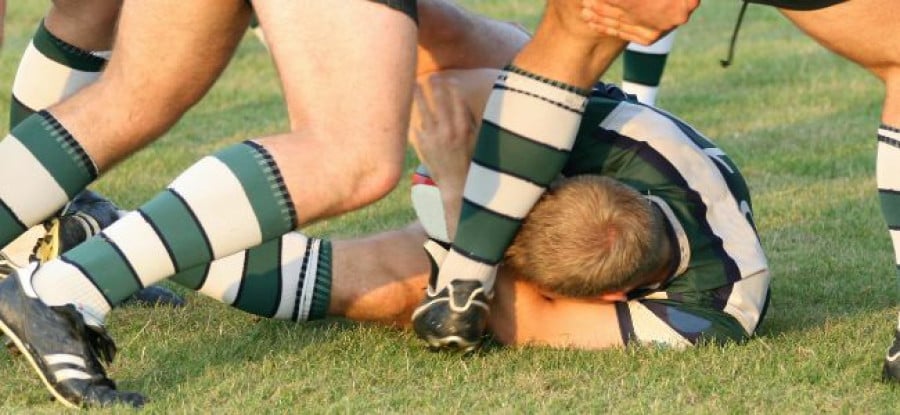Could incidents of concussion in sport be an issue of negligence?

On 18 September 2015, the Rugby World Cup kicked off with England playing Fiji. During the course of the 48 games that will take place, a number of players will, undoubtedly, be concussed. The focus on concussion in the forthcoming World Cup compared to the previous World Cup in 2011 will be marked. In the last 4 years elite sport has spent much time debating the management of concussion and the short and long term effects. What has caused the spotlight to be shone so brightly on this issue over the last 4 years?
In 2001 the National Football League Player Association partnered with the Centre for the Study of Retired Athletes to look at the consequences of the impacts sustained through playing American Football. Around the same time, in November 2001, the governing bodies for football (FIFA), the Olympics (IOC) and ice hockey (IIHF) convened the 1st International Consensus Conference on Concussion in Sport which took place in Vienna.
Whilst elite sport debated the issue, Ben Robinson, aged 14 years, is playing rugby for Carrickfergus Grammar School in Ireland on 29 January 2011.1 Early in the second half, Ben suffers two concussive blows to the head. He can’t remember the score and is unsteady on his feet but continues playing. With a minute to go Ben collapses and falls unconscious in the arms of his mother. Ben died 2 days later and, at the subsequent inquest, the coroner ruled that Ben had died from second impact syndrome. Since Ben’s death, his father, Peter, has channelled his grief into campaigning and raising awareness about the dangers of concussion.
18 months later, in November 2012, and 11 years after the Vienna conference, the 4th International Consensus Conference on Concussion was taking place in Zurich.2 There was significant disagreement at that meeting as to the protocols to be implemented for concussions in sport.3 Dr Barry O’Driscoll, who had been a medical advisor to the IRB for 15 years, was anxious that player welfare was not being protected through the interpretation of the recommendations arising from the Zurich conference. He resigned his post.
By August 2013, following months of court ordered mediation, a $765m (£490m) settlement was reached between the NFL and former players. The basis of the settlement being grave concern about the prevalence of neuro-cognitive disorders among former American Football players having been caused by repeated concussions sustained whilst playing in the NFL and the players having been misinformed about this over their careers.
The culmination of the above events over the last 4 years has generated such momentum that the profile and commentary on the issue of concussion has risen exponentially. In the 2015 RBS 6 nations, the experiences of George North, Mike Brown and Jonny Sexton – to name only three of the highest profile players – demonstrated a sea change in the recognition of and reaction to concussion injuries.4 All 3 players have had periods of time out of the game to allow their head injuries to recover.
To continue reading or watching login or register here
Already a member? Sign in
Get access to all of the expert analysis and commentary at LawInSport including articles, webinars, conference videos and podcast transcripts. Find out more here.
- Tags: 2015 Rugby World Cup | Australian Rugby Union (ARU) | Boxing | British Medical Association | Employment Law | FIFA | Football | Governance | Ice Hockey | International Ice Hockey Federation (IIHF) | IOC | Management of Health and Safety at Work Regulations 1999 | National Football League (NFL) | Negligence | NFL Players Association (NFLPA) | Olympic | Personal Protective Equipment at Work Regulations 1992 | Pitchside Suspected Concussion Assessment (PSCA) | Provision and Use of Work Equipment Regulations 1998 | Regulation | Rugby Football Union (RFU) | Rugby Union | Six Nations | United Kingdom (UK) | United States of America (USA)
Related Articles
- Concussion Management in Sport: Insurance & Commercial Implications Explored
- An overview of concussion protocols across professional sports leagues
- Symptom free: will the law strike a knockout blow on concussion in rugby?
- The knock out blow: how Australia is tackling concussion & neck injuries
- The legality of boxing: a punch drunk love?
Written by
Ian Christian
Ian Christian is a medical negligence partner and deals with a wide variety of claims for individuals who have received substandard medical treatment.
Stephen Nye
Stephen Nye is a partner in the Birmingham Serious Injury team.


 Global Summit 2024
Global Summit 2024